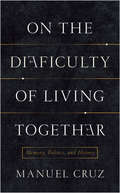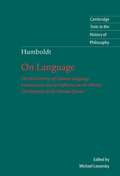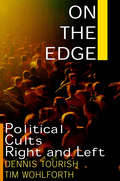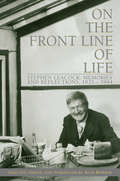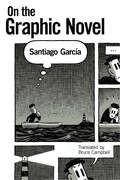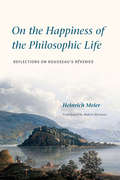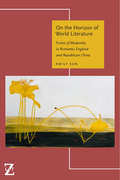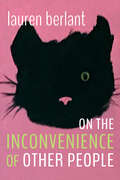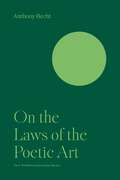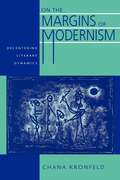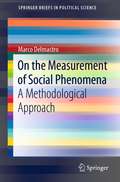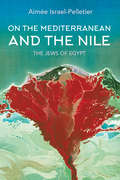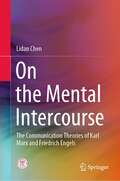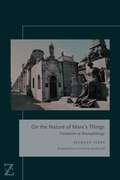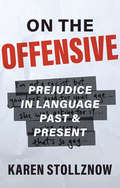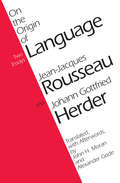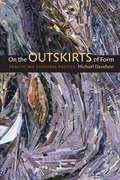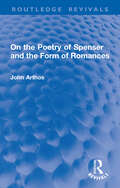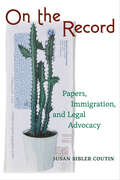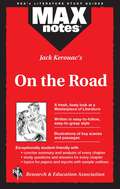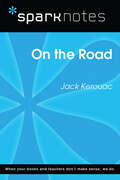- Table View
- List View
On the Difficulty of Living Together: Memory, Politics, and History (New Directions in Critical Theory #21)
by Manuel CruzIn On the Difficulty of Living Together, Manuel Cruz launches a nuanced study of memory and forgetting, defining their forms and uses, political meanings, and social and historical implications. Memory is not an intrinsically positive phenomenon, he argues, but an impressionable and malleable one, used to advance a variety of agendas. Cruz focuses on five memory models: that which is inherently valuable, that which legitimizes the present, that which supports retributive justice, that which is essential to mourning, and that which elicits renunciation or revelation. His methodical approach makes sense of memory's positive and negative effects, its contradictions, and its tensions. Cruz shows us that remembering is not necessarily an end in itself, nor is it a supreme value, immune to external influence. The exercise of memory guarantees nothing, though many insist it is a progressive act preventing the repetition of past mistakes. Tying the making of memory to the movements of history, Cruz prioritizes memory's political dimensions over its philosophical aspects and helps us remember its myriad uses.
On the Diversity of Human Language Construction and Its Influence on the Mental Development of the Human Species
by Peter Heath Wilhelm Von Humboldt Michael LosonskyWilhelm von Humboldt's classic study of human language was first published in 1836, as a general introduction to his three-volume treatise on the Kawi language of Java. It is the final statement of his lifelong study of the nature of language, exploring its universal structures and its relation to mind and culture. Empirically wide-ranging - Humboldt goes far beyond the Indo-European family of languages - it remains one of the most interesting and important attempts to draw philosophical conclusions from comparative linguistics. This volume presents a translation by Peter Heath, together with an introduction by Michael Losonsky that places Humboldt's work in its historical context and discusses its relevance to contemporary work in philosophy, linguistics, cognitive science, and psychology.
On the Edge: Feeling Precarious in China
by Margaret HillenbrandCharismatic artists recruit desperate migrants for site-specific performance art pieces, often without compensation. Construction workers threaten on camera to jump from the top of a high-rise building if their back wages are not paid. Users of a video and livestreaming app hustle for views by eating excrement or setting off firecrackers on their genitals. In these and many other recent cultural moments, China’s suppressed social strife simmers—or threatens to boil over.On the Edge probes precarity in contemporary China through the lens of the dark and angry cultural forms that chronic uncertainty has generated. Margaret Hillenbrand argues that a vast underclass of Chinese workers exist in “zombie citizenship,” a state of dehumanizing exile from the law and its safeguards. Many others also feel precarious—sensing that they live on a precipice, with the constant fear of falling into this abyss of dispossession, disenfranchisement, and dislocation. Examining the volatile aesthetic forms that embody stifled social tensions and surging anxiety over zombie citizenship, Hillenbrand traces how people use culture to vent taboo feelings of rage, resentment, distrust, and disdain in scenarios rife with cross-class antagonism.On the Edge is highly interdisciplinary, fusing digital media, art history, literary criticism, and performance studies with citizenship, protest, and labor studies. It makes both the distinctive Chinese experience and the vital role of culture central to global understandings of how entrenched insecurity and civic jeopardy fray the bonds of the social contract.
On the Edge: Political Cults Right and Left
by Tim Wohlforth Dennis TourishThis is the first book to document the extent of political cults on both the right and left and explain their significance for mainstream political organizations. The authors outline the defining characteristics of cults in general, and analyze the degree to which a variety of well-known movements fall within the spectrum of cultic organizations. The book covers such individuals and groups as Lyndon LaRouche, Fred Newman, Ted Grant, Marlene Dixon, the Christian Identity movement, Posse Commitatus, Aryan Nation, militias, and the Freemen. It explores the ideological underpinnings that predispose cult followers to cultic practices, along with the measures cults use to suppress dissent, achieve intense conformity, and extract extraordinary levels of commitment.
On the Front Line of Life: Memories and Reflections, 1935-1944
by Alan BowkerIn the last decade of his life, Leacock turned to writing informal essays that blended humour with a conversational style and ripened wisdom to address the issues he cared about most - education, literature, economics, Canada and its place in the world - and to confront the joys and sorrows of his own life. With an introduction that sets them in the context of his life, thoughts and times, these essays reveal a passionate, intellegent, personal Leacock, against a backdrop of Depression and war, finding hope and conveying the timeless message that only the human spirit can bring social justice, peace, and progress.
On the Graphic Novel
by Santiago GarcíaA noted comics artist himself, Santiago García follows the history of the graphic novel from early nineteenth-century European sequential art, through the development of newspaper strips in the United States, to the development of the twentieth-century comic book and its subsequent crisis. He considers the aesthetic and entrepreneurial innovations that established the conditions for the rise of the graphic novel all over the world. García not only treats the formal components of the art, but also examines the cultural position of comics in various formats as a popular medium. Typically associated with children, often viewed as unedifying and even at times as a threat to moral character, comics art has come a long way. With such examples from around the world as Spain, France, Germany, and Japan, García illustrates how the graphic novel, with its increasingly global and aesthetically sophisticated profile, represents a new model for graphic narrative production that empowers authors and challenges longstanding social prejudices against comics and what they can achieve.
On the Happiness of the Philosophic Life
by Heinrich Meier Robert BermanOn the Happiness of the Philosophic Life presents Heinrich Meier's confrontation with Rousseau's Rêveries, the philosopher's most beautiful and daring work, as well as his last and least understood. Bringing to bear more than thirty years of study of Rousseau, Meier unfolds his stunningly original interpretation in two parts. The first part of On the Happiness of the Philosophic Life approaches the Rêveries not as another autobiographical text in the tradition of the Confessions and the Dialogues, but as a reflection on the philosophic life and the distinctive happiness it provides. The second turns to a detailed analysis of a work referred to in the Rêveries, the "Profession of Faith of the Savoyard Vicar," which triggered Rousseau's political persecution when it was originally published as part of Émile. In his examination of this most controversial of Rousseau's writings, which aims to lay the foundations for a successful nonphilosophic life, Meier brings to light the differences between natural religion as expressed by the Vicar and Rousseau's natural theology. Together, the two reciprocally illuminating parts of this study provide an indispensable guide to Rousseau and to the understanding of the nature of the philosophic life.
On the Happiness of the Philosophic Life: Reflections on Rousseau's Rêveries in Two Books
by Heinrich MeierOn the Happiness of the Philosophic Life presents Heinrich Meier’s confrontation with Rousseau’s Rêveries, the philosopher’s most beautiful and daring work, as well as his last and least understood. Bringing to bear more than thirty years of study of Rousseau, Meier unfolds his stunningly original interpretation in two parts. The first part of On the Happiness of the Philosophic Life approaches the Rêveries not as another autobiographical text in the tradition of the Confessions and the Dialogues, but as a reflection on the philosophic life and the distinctive happiness it provides. The second turns to a detailed analysis of a work referred to in the Rêveries, the “Profession of Faith of the Savoyard Vicar,” which triggered Rousseau’s political persecution when it was originally published as part of Émile. In his examination of this most controversial of Rousseau’s writings, which aims to lay the foundations for a successful nonphilosophic life, Meier brings to light the differences between natural religion as expressed by the Vicar and Rousseau’s natural theology. Together, the two reciprocally illuminating parts of this study provide an indispensable guide to Rousseau and to the understanding of the nature of the philosophic life. “[A] dense but precise and enthralling analysis.”—New Yorker
On the Horizon of World Literature: Forms of Modernity in Romantic England and Republican China (Lit Z)
by Emily SunOn the Horizon of World Literature compares literary texts from asynchronous periods of incipient literary modernity in different parts of the world: Romantic England and Republican China. These moments were oriented alike by “world literature” as a discursive framework of classifications that connected and re-organized local articulations of literary histories and literary modernities. World literature thus provided—and continues to provide—a condition of possibility for conversation between cultures as well as for their mutual provincialization.The book offers readings of a selection of literary forms that serve also as textual sites for the enactment of new socio-political forms of life. The literary manifesto, the tale collection, the familiar essay, and the domestic novel function as testing grounds for questions of both literary-aesthetic and socio-political importance: What does it mean to attain a voice? What is a common reader? How does one dwell in the ordinary? What is a woman? In different languages and activating heterogeneous literary and philosophical traditions, works by Percy Bysshe Shelley, Lu Xun, Charles and Mary Lamb, Lin Shu, Zhou Zuoren, Jane Austen, and Eileen Chang explore the far-from-settled problem of what it means to be modern in different lifeworlds.Sun’s book brings to light the disciplinary-historical impact world literature has had in shaping literary traditions and practices around the world. The book renews the practice of close reading by offering the model of a deprovincialized close reading loosened from confinement within monocultural hermeneutic circles. By means of its own focus on England and China, the book provides methods useful for comparatists working between other Western and non-Western languages. It establishes the critical significance of Romanticism for the discipline of literary studies and opens up new paths of research in global Romanticism and global nineteenth-century studies. And it offers a new approach to analyzing the cosmopolitan character of the literary and cultural transformations of early twentieth-century China.
On the Inconvenience of Other People (Writing Matters!)
by Lauren BerlantIn On the Inconvenience of Other People Lauren Berlant continues to explore our affective engagement with the world. Berlant focuses on the encounter with and the desire for the bother of other people and objects, showing that to be driven toward attachment is to desire to be inconvenienced. Drawing on a range of sources, including Last Tango in Paris, Ralph Waldo Emerson, Claudia Rankine, Christopher Isherwood, Bhanu Kapil, the Occupy movement, and resistance to anti-Black state violence, Berlant poses inconvenience as an affective relation and considers how we might loosen our attachments in ways that allow us to build new forms of life. Collecting strategies for breaking apart a world in need of disturbing, the book’s experiments in thought and writing cement Berlant’s status as one of the most inventive and influential thinkers of our time.
On the Laws of the Poetic Art (The A. W. Mellon Lectures in the Fine Arts #41)
by Anthony HechtA magisterial exploration of poetry’s place in the fine arts by one of the twentieth century's leading poetsIn this book, eminent poet Anthony Hecht explores the art of poetry and its relationship to the other fine arts. While the problems he treats entail both philosophic and theoretical discussion, he never allows abstract speculation to overshadow his delight in the written texts that he introduces, or in the specific examples of painting and music to which he refers. After discussing literature’s links with painting and music, Hecht investigates the theme of paradise and wilderness, especially in Shakespeare’s The Tempest. He then turns to the question of public and private art, exploring the ways in which all the arts participate in balances between private and public modes of discourse, and between an exclusive or elitist role and the openly political. Beginning with a discussion of architecture as an illustration of a more general theme of discord and balance, the penultimate lecture probes the inner contradictions of works of art and our reactions to them, while the final piece concerns art and morality.
On the Margins of Modernism: Decentering Literary Dynamics (Contraversions: Critical Studies in Jewish Literature, Culture, and Society #2)
by Chana KronfeldModernism valorizes the marginal, the exile, the "other"—yet we tend to use writing from the most commonly read European languages (English, French, German) as examples of this marginality. Chana Kronfeld counters these dominant models of marginality by looking instead at modernist poetry written in two decentered languages, Hebrew and Yiddish. What results is a bold new model of literary dynamics, one less tied to canonical norms, less limited geographically, and less in danger of universalizing the experience of minority writers.Kronfeld examines the interpenetrations of modernist groupings through examples of Hebrew and Yiddish poetry in Europe, the U.S., and Israel. Her discussions of Amichai, Fogel, Raab, Halpern, Markish, Hofshteyn, and Sutskever will be welcomed by students of modernism in general and Hebrew and Yiddish literatures in particular.
On the Measurement of Social Phenomena: A Methodological Approach (SpringerBriefs in Political Science)
by Marco DelmastroThis book explores the analysis of social phenomena, using a multidisciplinary approach while addressing statistical, economic, sociological, as well as psychological issues.The author presents a detailed account of the procedures and techniques used to gather, process, and analyze data. Topics covered include, but are not limited to survey data, content analysis data, data visualization, as well as data about crimes.The book addresses this methodological framework that drives applied social sciences in an applicative and simple way, by analyzing key social phenomena such as the threats to journalism, the so-called chilling effect, and the market for news. Finally, the author examines the data and measures of the recent COVID-19 pandemic.This book is a must-read for everybody interested in a better understanding of the methodological analysis of social phenomena, social and political methodology, and applied science in general.
On the Mediterranean and the Nile: The Jews of Egypt (Indiana Series in Sephardi and Mizrahi Studies)
by Aimée Israel-PelletierAimée Israel-Pelletier examines the lives of Middle Eastern Jews living in Islamic societies in this political and cultural history of the Jews of Egypt. By looking at the work of five Egyptian Jewish writers, Israel-Pelletier confronts issues of identity, exile, language, immigration, Arab nationalism, European colonialism, and discourse on the Holocaust. She illustrates that the Jews of Egypt were a fluid community connected by deep roots to the Mediterranean and the Nile. They had an unshakable sense of being Egyptian until the country turned toward the Arab East. With Israel-Pelletier's deft handling, Jewish Egyptian writing offers an insider's view in the unique character of Egyptian Jewry and the Jewish presence across the Mediterranean region and North Africa.
On the Mental Intercourse: The Communication Theories of Karl Marx and Friedrich Engels
by Lidan ChenThis book meticulously examines the works of Karl Marx and Friedrich Engels (including numerous letters) to present their thoughts on communication and media studies from the perspective of “world intercourse” to reveal their spread in all areas of social information dissemination of ideas. The scope of the book ranges from language, writing and printing to newspapers, and from religion, literature and art, public opinion, and publicity to news, the communication revolution, communication policy, communication psychology, and the free exchanges of workers in the party. It is intended for readers with a college degree or above, especially those concerned about the dissemination of information and social interaction as well as intercourse.
On the Nature of Marx's Things: Translation as Necrophilology (Lit Z)
by Jacques LezraOn the Nature of Marx’s Things is a major rethinking of the Marxian tradition, one based not on fixed things but on the inextricable interrelation between the material world and our language for it. Lezra traces to Marx’s earliest writings a subterranean, Lucretian practice that he calls necrophilological translation that continues to haunt Marx’s inheritors. This Lucretian strain, requiring that we think materiality in non-self-evident ways, as dynamic, aleatory, and always marked by its relation to language, raises central questions about ontology, political economy, and reading.“Lezra,” writes Vittorio Morfino in his preface, “transfers all of the power of the Althusserian encounter into his conception of translation.” Lezra’s expansive understanding of translation covers practices that put different natural and national languages into relation, often across periods, but also practices or mechanisms internal to each language. Obscured by later critical attention to the contradictory lexicons—of fetishism and of chrematistics—that Capital uses to describe how value accrues to commodities, and by the dialectical approach that’s framed Marx’s work since Engels sought to marry it to the natural philosophy of his time, necrophilological translation has a troubling, definitive influence in Marx’s thought and in his wake. It entails a radical revision of what counts as translation, and wholly new ways of imagining what an object is, of what counts as matter, value, sovereignty, mediation, and even number. In On the Nature of Marx’s Things a materialism “of the encounter,” as recent criticism in the vein of the late Althusser calls it, encounters Marxological value-form theory, post-Schmittian divisible sovereignty, object-oriented-ontologies and the critique of correlationism, and philosophies of translation and untranslatability in debt to Quine, Cassin, and Derrida. The inheritors of the problems with which Marx grapples range from Spinoza’s marranismo, through Melville’s Bartleby, through the development of a previously unexplored Freudian political theology shaped by the revolutionary traditions of Schiller and Verdi, through Adorno’s exilic antihumanism against Said’s cosmopolitan humanism, through today’s new materialisms.Ultimately, necrophilology draws the story of capital’s capture of difference away from the story of capital’s production of subjectivity. It affords concepts and procedures for dismantling the system of objects on which neoliberal capitalism stands: concrete, this-wordly things like commodities, but also such “objects” as debt traps, austerity programs, the marketization of risk; ideologies; the pedagogical, professional, legal, even familial institutions that produce and reproduce inequities today.
On the Offensive: Prejudice in Language Past and Present
by Karen StollznowI'm not a racist, but… You look good, for your age… She was asking for it… You're crazy… That's so gay… Have you ever wondered why certain language has the power to offend? It is often difficult to recognize the veiled racism, sexism, ageism (and other –isms) that hide in our everyday discourse. This book sheds light on the derogatory phrases, insults, slurs, stereotypes, tropes and more that make up linguistic discrimination. Each chapter addresses a different area of prejudice: race and ethnicity; gender identity; sexuality; religion; health and disability; physical appearance; and age. Drawing on hot button topics and real-life case studies, and delving into the history of offensive terms, a vivid picture of modern discrimination in language emerges. By identifying offensive language, both overt and hidden, past and present, we uncover vast amounts about our own attitudes, beliefs and values and reveal exactly how and why words can offend.
On the Origin of Language
by Jean-Jacques Rousseau Johann Gottfried HerderThis volume combines Rousseau's essay on the origin of diverse languages with Herder's essay on the genesis of the faculty of speech. Rousseau's essay is important to semiotics and critical theory, as it plays a central role in Jacques Derrida's book Of Grammatology, and both essays are valuable historical and philosophical documents.
On the Origin of Language: Two Essays
by Jean-Jacques Rousseau Johann Gottfried HerderThis volume combines Rousseau's essay on the origin of diverse languages with Herder's essay on the genesis of the faculty of speech. Rousseau's essay is important to semiotics and critical theory, as it plays a central role in Jacques Derrida's book Of Grammatology, and both essays are valuable historical and philosophical documents.
On the Outskirts of Form: Practicing Cultural Poetics
by Michael DavidsonThis new book by eminent scholar Michael Davidson gathers his essays concerning formally innovative poetry from modernists such as Mina Loy, George Oppen, and Wallace Stevens to current practitioners such as Cristina Rivera-Garza, Heriberto Yepez, Lisa Robertson, and Mark Nowak. The book considers poems that challenge traditional poetic forms and in doing so trouble normative boundaries of sexuality, subjectivity, gender, and citizenship. At the heart of each essay is a concern with the "politics of form," the ways that poetry has been enlisted in the constitution--and critique--of community. Davidson speculates on the importance of developing cultural poetics as an antidote to the personalist and expressivist treatment of postwar poetry. A comprehensive and versatile collection, On the Outskirts of Form places modern and contemporary poetics in a cultural context to reconsider the role of cultural studies and globalization in poetry.
On the Past, Present, and Future of Semioethics: A Dialogue with Susan Petrilli (Routledge Research in Language and Communication)
by Susan Petrilli Simon LevesqueThis volume charts the origins, development, and future potential of semioethics through the work of Susan Petrilli, showcasing an extended dialogue with one of the eminent figures in semiotics scholarship.Featuring a wide-ranging conversation between Petrilli and scholar Simon Levesque, the book makes the case for semioethics as a critical approach that can help us better understand important issues at stake in today’s world, such as precarity, social responsibility, and climate change, through the interplay of signs, meaning-making, and interpretation. The dialogue is organized around key chapters in Petrilli’s career, exploring the influences of such scholars as Peirce and Bakhtin, the collaborations with Sebeok and Eco, and the efforts in revitalizing the work of Victoria Welby. The book explores how these strands culminated in the creation of semioethics with Petrilli’s longtime collaborator, Augusto Ponzio, and looks ahead to new directions for the further study of the relation between signs and values, semiotics and axiology, and communication and ethics.Highlighting the expansiveness of Petrilli’s body of work and the possibilities of semioethics in addressing key questions in contemporary social life for a better world, this volume will be of interest to scholars in semiotics, language and communication, philosophy of language, and cultural studies.
On the Poetry of Spenser and the Form of Romances (Routledge Revivals)
by John ArthosOriginally published in 1956, this scholarly study of Spenser’s poetry shows how the conceptions of his earlier work in complaints, visions and pastorals were of continuing importance to the development of The Faerie Queene. Following on from Bishop Hurd’s Letters on Chivalry and Romance, John Arthos discusses the congeniality of romance and allegory. The form and substance of Spenser’s lyrical and meditative poetry were combined with his interest in romances to govern the progress of the great work, and in the Mutabilitie Cantos they assert a dominant emphasis. In continuing many of the features characteristic of medieval romances, in taking up the innovations of Boiardo and Ariosto, and in giving expression to a view of life and especially of love that had not been made before in romantic literature, Spenser set himself a framework of so many and such complex interests that he failed to construct in The Faerie Queene the unity one might expect after reading the letter to Raleigh. The author believes that Tasso’s theories provide the terms that explain how Spenser meant to effect the unity of his poem, and that they also explain why the Mutabilitie Cantos belong to a radically different conception. Acknowledging that the allegories in Spenser’s work are obscure or unevenly developed John Arthos’ book maintains the idea that romance and allegory were integrally conceived in the Poem.
On the Record: Papers, Immigration, and Legal Advocacy
by Susan Bibler CoutinA free ebook version of this title is available through Luminos, University of California Press’s Open Access publishing program. Visit www.luminosoa.org to learn more. Immigrant residents seeking legal status in the United States face a catch-22: the documents that they must present to immigration officials—bank records, paycheck stubs, and contracts in their own names—are often challenging for undocumented people to obtain. In this book, Susan Bibler Coutin analyzes how undocumented immigrants and the attorneys and paralegals who represent them attempt to surmount this and other documentary challenges. Based on four years of fieldwork and volunteer work in the legal services department of an immigrant-serving nonprofit and in-depth interviews with those seeking status, On the Record explores these complex dynamics by taking seriously both documents themselves and the legal craft that has developed around their use.
On the Road (MAXnotes Literature Guides)
by Kevin KellyREA's MAXnotes for Jack Kerouac's On the Road MAXnotes offer a fresh look at masterpieces of literature, presented in a lively and interesting fashion. Written by literary experts who currently teach the subject, MAXnotes will enhance your understanding and enjoyment of the work. MAXnotes are designed to stimulate independent thought about the literary work by raising various issues and thought-provoking ideas and questions. MAXnotes cover the essentials of what one should know about each work, including an overall summary, character lists, an explanation and discussion of the plot, the work's historical context, illustrations to convey the mood of the work, and a biography of the author. Each chapter is individually summarized and analyzed, and has study questions and answers.
On the Road (SparkNotes Literature Guide Series)
by SparkNotesOn the Road (SparkNotes Literature Guide) by Jack Kerouac Making the reading experience fun! Created by Harvard students for students everywhere, SparkNotes is a new breed of study guide: smarter, better, faster. Geared to what today's students need to know, SparkNotes provides: *Chapter-by-chapter analysis *Explanations of key themes, motifs, and symbols *A review quiz and essay topicsLively and accessible, these guides are perfect for late-night studying and writing papers
